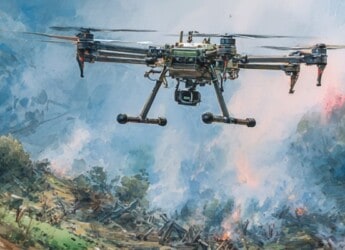Editor’s Note: The Russo-Ukrainian War, as of January 25, 2025, underscores the multifaceted nature of modern conflict. This assessment delves into critical developments over recent days, including Ukraine’s bold energy diplomacy with Moldova aimed at weakening Russian influence in Transnistria, a key geopolitical battleground. On the eastern front, fierce clashes in Donetsk and Luhansk Oblasts reflect Russia’s continued push for territorial control amid significant Ukrainian resistance. Beyond the battlefield, Russia’s diplomatic overtures in Iraq and deeper integration with Belarus reveal the Kremlin’s broader strategy to expand its influence in the face of global scrutiny.
This report not only captures these pivotal moments but also considers their wider implications in an age where conventional warfare intersects with cyber operations and strategic information management. As Ukraine and its allies confront Moscow’s hybrid warfare tactics, the lessons from these events are critical for professionals in cybersecurity, information governance, and global policymaking. The enduring interplay between physical conflict and digital landscapes offers a profound reminder of how modern wars shape and are shaped by global networks of power, data, and influence.
For those seeking to grasp the full scope of this evolving landscape, the complete updates from the Institute for the Study of War serve as an invaluable resource.
Content Assessment: Battlelines of Attrition: Energy, Influence, and Resistance in the Russo-Ukrainian War
Information - 93%
Insight - 91%
Relevance - 90%
Objectivity - 93%
Authority - 95%
92%
Excellent
TA short percentage-based assessment of the qualitative benefit expressed as a percentage of positive reception of the recent article from ComplexDiscovery OÜ titled, "Battlelines of Attrition: Energy, Influence, and Resistance in the Russo-Ukrainian War.
Background Note: ComplexDiscovery’s staff offers distinctive perspectives on the Russo-Ukrainian war and Middle Eastern conflicts, informed by military experience on the West German, East German, and Czechoslovakian border during the Cold War and in Sinai as part of Camp David Accord compliance activities. This firsthand regional knowledge has been further enhanced by recent staff travels to Eastern European countries, including Estonia, Finland, Latvia, Lithuania, and Poland. These visits have provided up-to-date, on-the-ground insights into the current geopolitical climate in regions directly impacted by the ongoing conflict.
Combined with cybersecurity, information governance, and eDiscovery proficiency, this multifaceted experience enables comprehensive analysis of these conflicts, including the critical impact of cyber warfare, disinformation, and digital forensics on modern military engagements. This unique background positions ComplexDiscovery to provide valuable insights for conflict-related investigations and litigation, where understanding the interplay of technology, data, and geopolitical factors is crucial.
Russo-Ukrainian Conflict Update*
Battlelines of Attrition: Energy, Influence, and Resistance in the Russo-Ukrainian War
ComplexDiscovery Staff
As the Russo-Ukrainian War enters another fierce chapter, the conflict has evolved into more than a battlefield struggle. It is now an intricate web of political maneuvering, technological adaptation, and strategic misdirection. This narrative captures the entwined threads of military advances, geopolitical strategies, and the battle for influence across physical and digital domains. It is a war waged not only with tanks and missiles but with information and alliances—a reality with profound implications for cybersecurity, information governance, and the digital landscape that shapes modern conflict.
In Kyiv, a pivotal meeting between Ukrainian President Volodymyr Zelensky and Moldovan President Maia Sandu illuminated a critical front in the war: energy. This seemingly technical issue serves as a proxy for broader struggles over influence and sovereignty in the region. Zelensky’s offer to supply Transnistria, Moldova’s Russian-supported breakaway region, with coal at low prices or even for free in exchange for electricity represents a direct challenge to Moscow’s grip on the energy-dependent region. By proposing collaboration that could slash electricity costs in Moldova by 30%, Kyiv and Chisinau counteract Russian strategies designed to portray the Kremlin as Transnistria’s economic savior. The stakes go beyond immediate energy supplies; a successful partnership between Moldova and Ukraine could upend Moscow’s influence in the region and disrupt its attempts to exploit energy as a tool of political coercion.
While Zelensky’s proposals aim to build regional resilience, Moscow continues to leverage its influence further afield. In Iraq, a delegation linked to the Kremlin-backed Rybar Telegram channel reportedly engaged with Iraqi officials, including Prime Minister Mohammad Shia Al-Sudani, to deepen economic ties and cultivate partnerships. This development reflects a broader Russian strategy to counterbalance perceived U.S. disengagement in the Middle East. The collapse of Syria’s Assad regime, a key Russian ally, has likely accelerated these efforts, revealing how Russia’s ambitions extend beyond Ukraine. Such maneuvers illustrate the increasingly global dimension of Moscow’s influence operations, a trend that cybersecurity and information governance professionals must track as state actors target critical infrastructure, digital systems, and strategic partnerships.
On the ground in Ukraine, Russian forces have sustained a grinding offensive along key axes. In Donetsk Oblast, advances near Toretsk, Pokrovsk, Kurakhove, and Velyka Novosilka reflect Moscow’s push to consolidate gains. Ukrainian forces, however, have demonstrated remarkable resilience, particularly in Chasiv Yar, where counterattacks inflicted heavy losses on Russian airborne units. These gains, while marginal, reveal the tactical precision and determination of Ukraine’s military, bolstered by Western support. In Luhansk Oblast, Russian forces sought to envelop Ukrainian positions around Kupyansk and Borova but encountered stiff resistance. This interplay of offensives and counteroffensives underscores the war’s fluid and attritional nature, where small territorial shifts mask broader strategic implications.
Russian President Vladimir Putin, meanwhile, continues to deploy rhetorical and diplomatic tactics as part of his war strategy. In a recent interview, he emphasized Ukraine’s 2022 decree banning negotiations with Moscow, framing it as the central obstacle to peace. This misrepresentation seeks to shift blame for the ongoing conflict while straining relations between Ukraine and its Western allies. By positioning himself as a potential interlocutor with U.S. President Donald Trump, Putin underscores his narrative that the war is not a Ukrainian struggle for sovereignty but a grander geopolitical confrontation between great powers. This framing has significant implications for global alliances, as it aims to weaken the resolve of Ukraine’s partners and recalibrate the discourse on international intervention.
The digital dimension of the war remains ever-present. Russia’s missile and drone campaigns, which include the use of domestically produced and imported drones, target Ukraine’s infrastructure, seeking to sap morale and disrupt critical systems. Ukrainian forces have responded with notable success, downing significant portions of Russian drones and countering these assaults with their own targeted strikes on Russian logistics and industrial hubs. This tit-for-tat in the digital and physical spheres highlights the convergence of kinetic warfare and cyber operations, offering key insights for eDiscovery and information governance professionals tasked with managing data integrity in conflict-affected regions.
Beyond the battlefield, the conflict extends into Belarus, where the Kremlin has solidified its grip through the Union State framework. The newly adopted Union State Security Concept promises greater integration between Russia and Belarus, further advancing Moscow’s goal of subordinating Belarusian sovereignty. These moves come amid a presidential election in Belarus, likely to prompt unrest and potential information suppression. For those in cybersecurity, the dynamics in Belarus emphasize the critical role of monitoring state-sponsored information controls and hybrid warfare tactics that blend conventional and digital domains.
For professionals in cybersecurity, information governance, and eDiscovery, the Russo-Ukrainian War is a case study in the complexities of modern conflict. The energy disputes in Transnistria, the leveraging of influence in Iraq, and the integration of digital and physical battlespaces reveal the intricate interdependence of geopolitics and technology. As digital forensics play a pivotal role in documenting war crimes, securing evidence, and combating misinformation, the war underscores the necessity of robust systems to manage, analyze, and secure data in volatile environments.
This war, fought in trenches and server rooms alike, is redefining the nature of sovereignty, alliances, and the conduct of global affairs. As the frontline soldiers battle for territorial integrity, those safeguarding the digital realms confront a different but equally vital struggle. Whether combating disinformation, securing infrastructure, or ensuring compliance in cross-border investigations, their efforts resonate across this theater of modern conflict. It is here, at the intersection of data and defense, that the echoes of resistance reverberate most profoundly, reminding us that in an interconnected world, no front is ever truly distant.
News Sources
As a leading source for cybersecurity, information governance, and legal discovery insights, including international investigations and litigation, ComplexDiscovery OÜ recognizes the importance of awareness regarding alleged and documented criminal acts, particularly in the context of the Russia-Ukraine conflict. While we, following the lead of the Institute for the Study of War (ISW), do not provide detailed coverage of war crimes in our primary reports, we encourage professionals within the eDiscovery ecosystem to stay informed about these activities. This awareness is crucial for understanding potential future legal actions and responsibilities.
Detailed Reporting with Maps for January 24-25, 2025, from the ISW – Mouseover to Scroll
Russo-Ukrainian War - January 24-25 2025 UpdateReview the Detailed Reporting and Maps PDF
About the Institute for the Study of War Research Methodology
ISW’s research methodology relies on both primary and secondary sources, enabling researchers to develop a comprehensive understanding of the situation on the ground. In order to analyze military and political developments in any given area, ISW’s research analysts must wholly understand the systems of enemy and friendly forces. They must also understand the population demographics, physical terrain, politics, and history of that area. This lays the analytical foundation for understanding the reasons for particular developments and fulfilling their assigned research objectives. ISW analysts also spend time in places like Iraq, Afghanistan, and elsewhere in order to gain a better understanding of the security and political situation and to evaluate the implementation of current strategies and policies. Our researchers compile data and analyze trends, producing a granular analysis of developments in areas of research, producing an accurate, high-resolution, timely, and thorough picture of the situation. ISW’s research methodology guarantees its success and commitment to improving the nation’s ability to execute military operations, achieve strategic objectives, and respond to emerging problems that may require the use of American military power.
About the Institute for the Study of War
The Institute for the Study of War advances an informed understanding of military affairs through reliable research, trusted analysis, and innovative education. They are committed to improving the nation’s ability to execute military operations and respond to emerging threats in order to achieve U.S. strategic objectives. ISW is a non-partisan, non-profit, public policy research organization.
Learn more, get involved, and contribute today.
Additional Reading
- From Dissent to OSINT? Understanding, Influencing, and Protecting Roles, Reputation, and Revenue
- [Annual Update] International Cyber Law in Practice: Interactive Toolkit
- Data Embassies: Sovereignty, Security, and Continuity for Nation-States
Assisted by GAI and LLM Technologies
* Sourced and shared with direct express permission from the Institute for the Study of War (ISW).
Source: ComplexDiscovery OÜ


























